How often should you take your cat to the veterinarian?
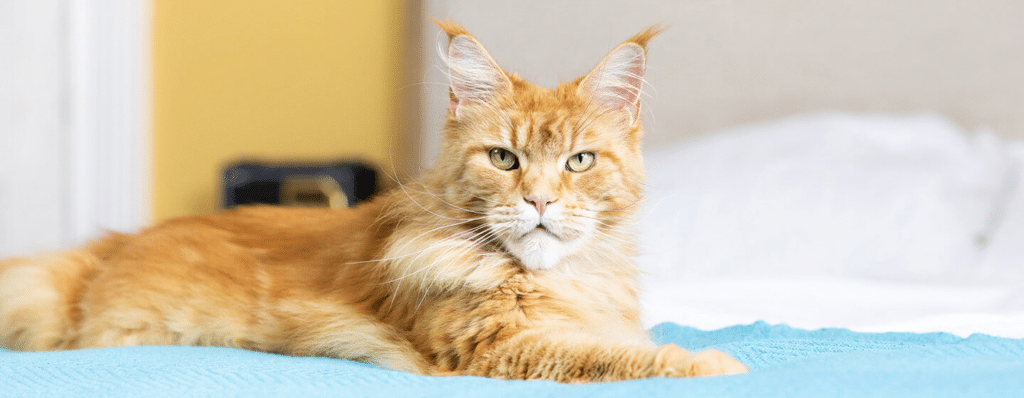
Taking proper care of your feline friend involves regular visits to the veterinarian. Cats, like any other pets, require routine medical check-ups to ensure their well-being and address any potential health concerns.
This article explores how often you should take your cat to the vet, discussing the importance of regular veterinary care, common vaccinations, preventive measures, and signs that indicate a visit to the vet is necessary.
Related: Pet Culture in Nigeria
Cat Health
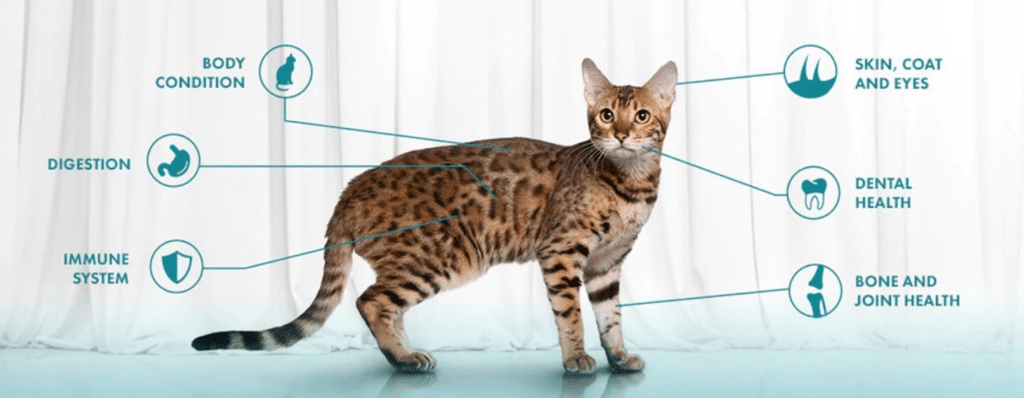
Cat health is an important topic for cat owners to be aware of. Cats can suffer from a variety of health problems, both common and uncommon. Some of the most common cat health problems include:
1. Infections
Cats can get infections from bacteria, viruses, and parasites. Some common infections in cats include upper respiratory infections, urinary tract infections, and skin infections.
2. Fleas and ticks
Fleas and ticks can transmit diseases to cats, as well as cause discomfort and itching.
3. Heartworms
Heartworms are a serious parasitic infection that can be fatal if not treated.
4. Diabetes
Diabetes is a condition in which the body doesn’t produce or use insulin properly. It can cause weight loss, increased thirst and urination, and other symptoms.
5. Kidney disease
Kidney disease is a common problem in older cats. It can cause weight loss, increased thirst and urination, and other symptoms.
6. Cancer
Cancer is a serious illness that can affect cats of all ages. Some common types of cancer in cats include lymphoma, skin cancer, and oral cancer.
Related: Can Dogs Have Honey? Important Facts to Know
The Importance of Regular Vet Visits
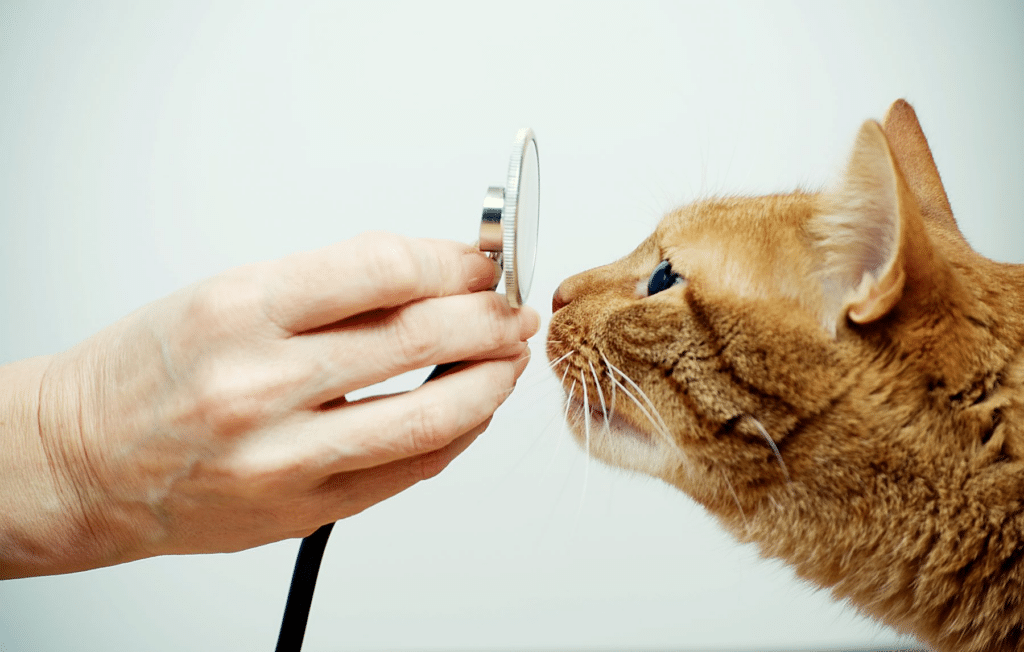
Regular veterinary visits play a vital role in maintaining your cat’s overall health. Even if your cat appears healthy, underlying issues may go unnoticed without professional evaluation.
Routine check-ups allow veterinarians to detect and prevent potential health problems early on, providing prompt treatment and improving your cat’s quality of life. Furthermore, these visits allow for discussions about your cat’s diet, behaviour, and lifestyle, enabling you to make informed decisions regarding their well-being.
Related: Popular Nigerian Dogs and Their Strange Uses
Why Regular Visits Are Essential For Cats
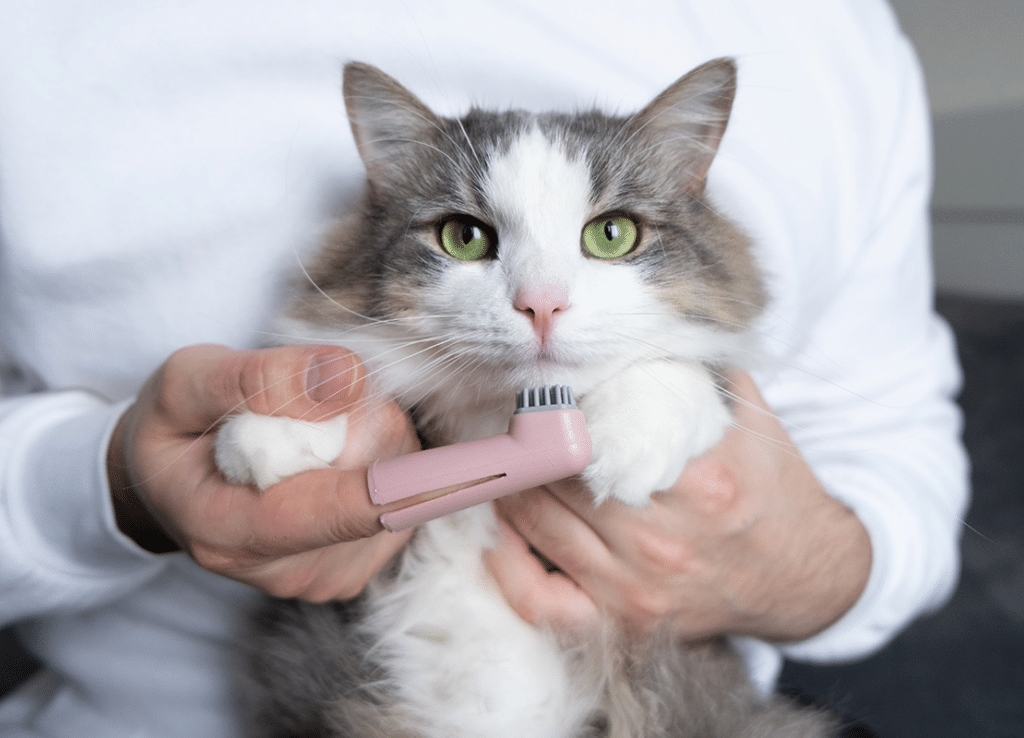
Regular vet visits are essential for cats for a number of reasons, including:
1. Early detection and prevention of health problems
Cats are very good at hiding signs of illness, so it’s important to have them seen by a veterinarian on a regular basis so that any potential problems can be caught early. This can lead to more successful treatments and a better outcome for your cat.
2. Vaccinations
Vaccinations help protect your cat from a variety of serious diseases, such as rabies, feline leukaemia, and feline distemper.
3. Preventive care
Your veterinarian can recommend other preventive care measures for your cat, such as flea and tick control, heartworm prevention, and dental care.
4. General health assessment
During a regular vet visit, your cat will be given a thorough physical exam, including checking their weight, body condition, eyes, ears, teeth, and overall health. This will help your veterinarian identify any potential problems early on.
5. Behavioural assessment
Your veterinarian can also assess your cat’s behaviour and offer advice on how to address any concerns you may have.
The frequency of regular vet visits will vary depending on your cat’s age, health status, and lifestyle. However, most cats should see the vet at least once a year. Senior cats and cats with chronic conditions may need to see the vet more frequently.
If you’re not sure how often your cat should see the vet, be sure to talk to your veterinarian. They can help you develop a personalized plan for your cat’s healthcare needs.
Related: 25+ Best Black Anime Characters
Factors That Influence The Frequency of Vet Visits
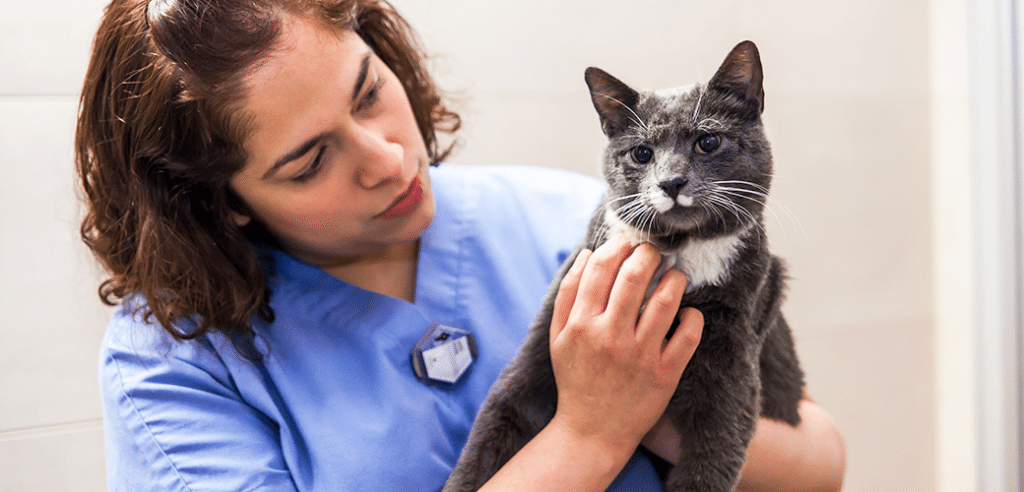
There are a number of factors that can influence the frequency of vet visits, including:
1. The cat’s age
Puppies and kittens need more frequent vet visits than adult cats. This is because they are more susceptible to certain diseases and infections.
2. The cat’s health status
Cats with chronic health conditions, such as diabetes or kidney disease, may need to see the vet more frequently. This is because they need to be monitored closely and their medications may need to be adjusted regularly.
3. The cat’s lifestyle
Outdoor cats are more likely to get into fights and contract diseases than indoor cats. They may also need to see the vet more frequently for vaccinations and parasite control.
4. The owner’s preferences
Some owners prefer to take their cats to the vet for regular checkups, even if they seem healthy. Others only take their cats to the vet when they are sick or injured.
5. The cost of vet care
Vet care can be expensive, so some owners may choose to take their cats to the vet less frequently.
The best way to determine how often your cat should see the vet is to talk to your veterinarian. They can assess your cat’s individual needs and recommend a frequency of visits that is right for them.
Related: 35+ Creative Neck Tattoo Designs for Men
Signs and Symptoms That Require Immediate Vet Attention for Cat

Here are some signs and symptoms that require immediate vet attention for cats:
1. Sudden onset of severe vomiting or diarrhoea
This could be a sign of a serious illness, such as poisoning, an intestinal obstruction, or acute gastrointestinal infection.
2. Refusal to eat or drink for more than 24 hours
This can lead to dehydration and other serious health problems.
3. Seizures
Seizures can be a sign of a serious underlying medical condition, such as epilepsy or a brain tumour.
4. Difficulty breathing
This could be a sign of a respiratory infection, heart disease, or other serious condition.
5. Collapse or loss of consciousness
This could be a sign of a number of serious medical conditions, such as a heart attack, stroke, or poisoning.
6. Bluish or pale gums
This could be a sign of a lack of oxygen, or a medical emergency.
7. Abnormal bleeding or bruising
This could be a sign of a blood clotting disorder or other serious medical condition.
8. Lumps or bumps on the body
These could be signs of cancer or other serious conditions.
9. Change in behaviour
This could be a sign of a number of medical conditions, such as pain, infection, or cognitive decline.
If you notice any of these signs or symptoms in your cat, it is important to seek veterinary attention immediately. Early diagnosis and treatment can help to improve your cat’s chances of full recovery.
Related: How Many Ounces in a Shot (Food Conversion Guide)
Vaccinations: Protecting Your Cat’s Health

Vaccinations are crucial for safeguarding your cat against various diseases. Kittens require a series of vaccinations to build up their immunity, while adult cats need regular booster shots to maintain protection.
The core vaccines recommended for cats include rabies, feline distemper (panleukopenia), feline herpesvirus, and feline calicivirus. Additionally, depending on your cat’s lifestyle and risk factors, your vet may recommend non-core vaccines such as those for feline leukaemia virus (FeLV) or feline immunodeficiency virus (FIV).
Related: Can Cockroaches Live in Your Penis?
Preventive Measures: Keeping Your Cat Safe and Healthy
Apart from vaccinations, several preventive measures contribute to your cat’s overall well-being. Regular deworming helps eliminate internal parasites that can cause various health problems.
Flea and tick control is essential to prevent infestations, as these parasites can transmit diseases to your cat. Additionally, maintaining proper oral hygiene through regular teeth cleaning and providing a balanced diet can prevent dental issues and promote overall health.
See Also: 115+ Thrilling Shower Thoughts for 2023
Signs That Indicate a Vet Visit is Necessary
While routine check-ups are crucial, certain signs may indicate that your cat requires immediate veterinary attention.
These signs include a loss of appetite, sudden weight loss or gain, changes in drinking or urination patterns, difficulty breathing, persistent vomiting or diarrhoea, lethargy, and unusual behaviours. If you notice any of these signs or anything else concerning, it’s important to consult your veterinarian promptly.
See Also: How to Make Money Online in Nigeria
How To Find The Right Veterinarian

Finding the right veterinarian for your cat can be a daunting task, but it’s important to do your research and find someone you trust. Here are some tips on how to find the right veterinarian for your cat:
1. Ask your friends, family, and neighbours for recommendations
This is a great way to get started and hear about personal experiences.
2. Check with your local animal shelters or rescue organizations
They may have recommendations for veterinarians who are familiar with the needs of shelter animals.
3. Look for veterinarians who are accredited by the American Animal Hospital Association (AAHA)
This means that the practice meets high standards of care and patient safety.
4. Visit the veterinarian’s website and read their reviews
This can give you a good sense of the practice’s philosophy and patient care.
5. Schedule a consultation with a few different veterinarians before making a decision
This will give you a chance to meet the veterinarians and see if they’re a good fit for you and your cat.
Here are some of the factors to consider when choosing a veterinarian:
- Location: Is the veterinarian’s office convenient for you to get to?
- Hours: Are the veterinarian’s hours of operation convenient for you?
- Cost: What is the cost of care at the veterinarian’s office?
- Services: What services does the veterinarian’s office offer?
- Experience: How much experience does the veterinarian have?
- Personality: Do you feel comfortable with the veterinarian’s personality?
- Communication: Does the veterinarian communicate well with you?
It’s important to find a veterinarian who you feel comfortable with and who you trust. Your cat’s health is important, so take the time to find the right veterinarian for them.
Conclusion
To wrap up, regular veterinary care is essential for the well-being of your beloved cat. By scheduling routine check-ups, staying up to date on vaccinations, and implementing preventive measures, you can ensure that your feline companion leads a healthy and happy life.
Remember, your veterinarian is the best resource for guidance on your cat’s specific needs and can provide personalized care.
If there are any questions, post them below.
Related articles:
- How Long Do Flies Live?
- How Long Do Butterflies Live? Find Out Below
- 3 Fascinating Things About ‘How Long Do Idiots Live’ Meme
FAQs
Do cats need to go to the veterinarian?
Yes, cats need to go to the vet. Regular vet visits are essential for keeping your cat healthy and happy. During a vet visit, your cat will receive a thorough physical exam, including checking their weight, body condition, eyes, ears, teeth, and overall health. The vet will also discuss your cat’s vaccination and parasite control needs.
Here are some of the reasons why cats need to go to the vet:
Preventive care: Regular vet visits allow your veterinarian to identify any potential health problems early on. This can lead to more successful treatments and a better outcome for your cat.
Vaccinations: Vaccinations help protect your cat from a variety of serious diseases, such as rabies, feline leukaemia, and feline distemper.
Parasite control: Parasites, such as fleas, ticks, and heartworms, can be a serious health hazard for cats. Your veterinarian can recommend the best parasite control products for your cat.
General health assessment: During a regular vet visit, your cat will receive a thorough physical exam. This will help your veterinarian identify any potential health problems early on.
Behavioural assessment: Your veterinarian can also assess your cat’s behaviour and offer advice on how to address any concerns you may have.
What to expect at the kitten’s first vet visit?
The first vet visit for your kitten is an important one. During this visit, the vet will give your kitten a thorough physical exam, including checking their weight, body condition, eyes, ears, teeth, and overall health. The vet will also discuss your kitten’s vaccination and parasite control needs.
Here are some of the things you can expect at your kitten’s first vet visit:
The vet will ask you about your kitten’s history, including their diet, litter box habits, and any health concerns you have.
The vet will give your kitten a physical exam, including weighing them, checking their body condition, and listening to their heart and lungs.
The vet may take a faecal sample to check for parasites.
The vet will discuss your kitten’s vaccination needs. Kittens need a series of vaccinations to protect them from a variety of diseases, such as rabies, feline leukaemia, and feline distemper.
The vet may discuss parasite control with you. Parasites, such as fleas, ticks, and heartworms, can be a serious health hazard for cats. Your vet can recommend the best parasite-control products for your kitten.
Can cats live without going to the vet?
Cats can technically live without going to the vet, but it is not recommended. Regular vet visits are essential for keeping your cat healthy and happy. During a vet visit, your cat will receive a thorough physical exam, including checking their weight, body condition, eyes, ears, teeth, and overall health. The vet will also discuss your cat’s vaccination and parasite control needs.
